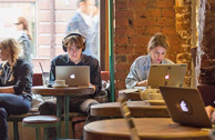为什么很多人更愿意去咖啡馆学习、工作?
|
Walk into any Starbucks on a weekend afternoon and you will find two things to be universally true: 1) The Unicorn Barf Frappuccino is gone and never coming back, so please stop asking about it, and 2) There are way too many people with laptops exploiting the cafe as their own public office space. Maybe you’re about to join them, yourself. This is not necessarily a bad thing. Anyone who has ever used a Starbucks for work purposes knows there is a special appeal about getting stuff done in the company of strangers and muffins. There is a palpable, productive, caffeinated energy in the air, an invisible camaraderie that cannot exist in the quiet of a home office. The productivity is literally contagious. You may even argue that you are more creative when working or writing at a coffee shop—and science is ready to back you up on that.
It turns out there literally is something productive in the air in public places: namely, the sound waves. A 2012 study from the University of British Columbia found that, counter-intuitively, a moderate amount of background noise can actually make you more creative than the bliss of silence. This conclusion resulted from an insidious study in which researchers piped increasing volumes of background noise into a room full of students engaged in word-association tests and product brainstorms, both of which demanded focus and creativity. Students performed best and generated the most creative solutions when working under moderate noise conditions—70 decibels of ambient sounds. They performed worse in low noise (50 db, the volume of a quiet room) and poorest in high noise (85db, the volume of a garbage disposal). Incidentally, 70 db is about the same volume of background noise that you’d find in a crowded cafe. What’s going on here? According to the researchers, a little distraction can be a good thing thanks to a mind trick called “processing disfluency”—basically, the ease or speed in which you can process information. While a “fluid” mental processing speed is most helpful for highly-focused tasks like, say, filing your taxes, this laser-focus can be detrimental to abstract thinking—you are mentally too close to the problem to be able to think abstractly, too caught up in the particulars. “This is why if you’re too focused on a problem and you’re not able to solve it,” said Dr. Ravi Mehta, one of the UBC paper’s authors. “You leave it for some time and then come back to it and you get the solution.” Just like shifting your focus away from the problem at hand, a moderate amount of noise can shake up your processing fluency just enough to approach ideas from a more creative, abstract position. The gentle bustle of a Starbucks forces you to approach your work from a slight mental distance, boosting creativity—but as soon as the barista hits the coffee grinder, your focus goes veering off track. The same is true if a song you can’t stand suddenly starts yodeling over the cafe speakers, or if the table next to you can’t contain their blathering political opinions; as a recent Japanese study points out, sounds that produce feelings of annoyance, regardless of their volume, have an adverse effect on productivity. “Meaningless” noise serves the creative best. |









